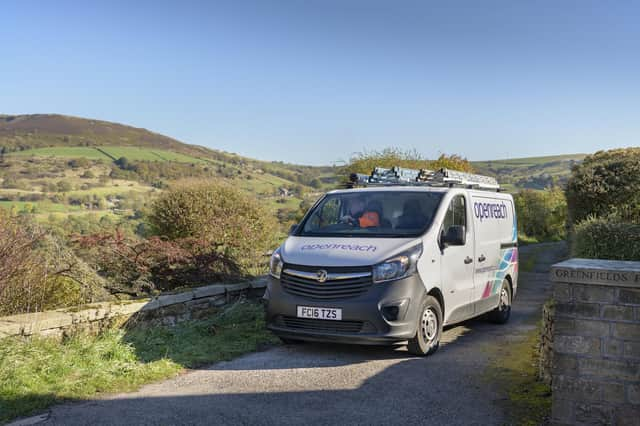Western Isles Council lambast broadband voucher scheme for rural areas


Councillors heard a presentation from Clive Downing, director of the Scottish Government’s R100 programme, which promises to bring high speed broadband to every home but will leave 2000 island households dependent on vouchers with no guarantees of how they can be used.
The 2000 voucher-dependent households under plans drawn up by BT OpenReach and approved by the Scottish Government include 1071 in Lewis and Harris, 253 in North Uist and 330 in South Uist, with smaller numbers in other islands.
Advertisement
Hide AdAdvertisement
Hide AdFor another 2000 households, the timescale for delivering the programme in the Western Isles has been moved from the end of 2021 to 2027 – far behind the vast majority of the Scottish mainland. These households are eligible for vouchers worth up to £5000 to make interim provision but these must be applied for by the end of this month.
Mr Downing, who repeatedly stressed that he was an engineer rather than responsible for policy, was challenged by South Uist councillor Iain McNeil about what had happened to the initial understanding that the roll-out would “start out and work in”. Instead, Mr MacNeil added: “We are last in the queue.”
However, this was disowned by Mr Downing who said: “The ‘outside in’ term was not coined by engineers. It is not an economically sensible way to proceed.”
Mr MacNeil also asked how many of the interim vouchers have been successfully applied for and utilised. Mr Downing replied: “None have been used in the Western Isles.”
Advertisement
Hide AdAdvertisement
Hide AdComhairle convener, Norman A. MacDonald, invoked the spirit of the post-war mission of the Hydro Board to bring power to every home, however remote. He said: “Seventy years ago, Tom Johnston was the person who brought electricity into the hills and glens of the Highlands and Islands. If he had not done that, nobody would be living in these areas today.
“The same applies now. If villages in the Outer Hebrides don’t have a reasonable broadband connection, people will move away. The Scottish Government has an obligation to fulfil the commitment that they originally made.”
Mr MacDonald pointed to the precedent of Great Bernera where, he said, HIE funded a programme to bring high speed broadband to every household. Yet a few miles away, for the past eight months, people had “watched poles being torn down and put up again” while they were left without reliable connections.
He added: “I don’t think there is any doubt about the strength of feeling on this …. The commitment to provide broadband is no different to the commitment given all these years ago by Tom Johnston. It is for Government to bite the bullet and deliver right across the north of Scotland.”
Advertisement
Hide AdAdvertisement
Hide AdMr Downing replied that he “absolutely accepted” that the future of rural communities depended on good broadband connections, but added: “All I can do is take that back to policy colleagues… I’m an engineer, not a politician.”
The die was cast for communities which are left to depend on vouchers when BT OpenReach submitted the tender that the Scottish Government accepted. By then, they had determined where the money should be spent – without any consultation or right of appeal. Mr Downing confirmed: “The build plan was built by the bidders.”
Councillor Norman MacDonald (Point) said it was pretty obvious that BT OpenReach, having left these areas outside their original bid, were not going to make provision for them “because someone is waving a voucher. I don’t understand where this voucher scheme comes into it. If you get 5k a house, who else is going to provide other than OpenReach?”
Admitting that there is “no market” at present, Mr Downing said they are trying to persuade other companies to compete for voucher-based work in the Western Isles. Councillor Kenny John MacLeod asked: “Why should there be any confidence in other suppliers coming in?”
Advertisement
Hide AdAdvertisement
Hide AdMr Downing suggested that once fibre connections are in place, other suppliers might extend the reach through voucher-based work. Mr MacLeod responded: “Why not do that in the first place, rather than create uncertainty for communities?” Mr Downing: “The amount of money to be contracted was limited.”
Councillor MacDonald (Point) asked: “Why do you go to 98 per cent connections and then start a voucher scheme?” He said the Scottish Government had to be serious about a commitment to rural communities, “go the extra mile” and “stop faffing about with voucher schemes”.
Another issue was raised by Councillor Paul Steele (South Uist) who asked who would be responsible for maintenance of connections paid for through the voucher scheme. Mr Downing replied: “The voucher is for capital cost only.”
Committee chairman, Donald Crichton, returned to the contrast with Tom Johnston’s approach to universal provision of electricity throughout the north. He said: “That is how important it is to the Highlands and Islands in terms of social and economic development. What the Comhairle is looking for is fully funded 100 per cent coverage.”